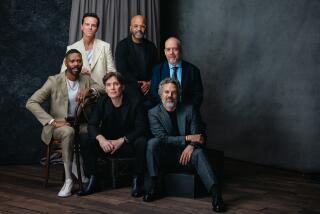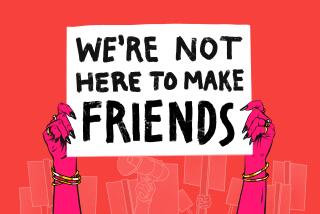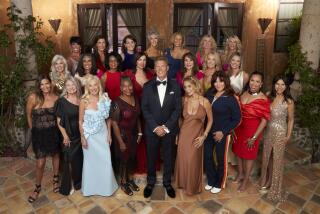Searching for the next ‘Star’
GREG Harvey might’ve resorted to a withering wisecrack, a la Simon Cowell, or reached for a gong, Chuck Barris-style, after hearing just a few notes from the aspiring singer standing before him, who was mangling “Music of the Night” from “The Phantom of the Opera.”
But here on the cutthroat front lines of the battle to find America’s next instantly famous amateur, Harvey offered up something more original: a patient, encouraging smile.
Harvey, a gangly 43-year-old with the build of an experienced dancer and the manner of a sympathetic pep rally organizer, screens would-be contestants for CBS’ updated version of the venerable talent-variety show “Star Search,” which launches Wednesday. As one of the show’s two talent producers for adult singers, he is the gatekeeper who decides which hopefuls have the right mix of talent and charisma to move on to subsequent rounds of auditions and, perhaps, make it to the televised competition.
That’s what brought him to the small meeting room at the Universal Hilton Hotel in mid-November, where he faced the singer, a personal trainer sporting a backward New York Yankees cap, who on this day was not merely off-key but also had trouble with the words. Perhaps trying to compensate for those shortcomings, the singer, Richard Smith, offered it all up in a booming voice that rattled the room’s walls.
But the tough-guy antics of Cowell, the real breakout star at archrival “American Idol,” aren’t Harvey’s style.
After a few more moments, Harvey graciously thanked Smith and glanced at the list in front of him.
One down; 241 more to go.
If you think the lot of wannabe performers is tough, consider Harvey’s job.
“Imagine having to sit for 10 hours listening to bad singers,” said Andrew Golder, executive producer of “Star Search.” “Not to be disrespectful, but in some far corner of the world, it could be considered torture.”
The cattle call at the Universal Hilton was the final day of the first pre-production stage for “Star Search,” which will feature live tournament-like competitions in four categories: adult singer, junior singer, comic and supermodel. Celebrity judges and viewers via the Internet will determine the winners. More than 10,000 contestants in Nashville, Dallas, Los Angeles and several other cities tried out for the new “Star Search.”
Though chances for making it to the second round were slim on this day, hundreds of show-biz hopefuls still invaded the hotel, prompting producers to work later than scheduled in an attempt to see as many contestants as possible. Among the fame-seekers hoping to impress Henry were college freshmen, hooky-playing workers and retirees. Some had come from as far as New York. A few -- very few -- had obvious talent. Others hovered around average. Many more were below average. And several standouts fell short of that level.
But no matter how talented or painful, Harvey regarded each contestant as if they might be the next Faith Hill or D’Angelo. Even as morning became late afternoon and early evening, and the onslaught of wannabes continued to swarm into the room, Harvey maintained his focus and enthusiasm.
“I have to make sure that I respond to each performer,” Harvey said. “Even if they don’t have a great audition, I want them to have a great experience. Getting up and singing in front of a group of strangers is the most vulnerable thing anybody can do. So even if they don’t have a great audition, I want them to think, ‘I had a great time trying out for this show.’ ”
He takes the responsibility seriously: “I can’t afford to miss anything. If someone is really talented but I’m too tired to notice it, then we both miss out. So no matter how tired I may feel, I have to be there, attentive, in the room, all the time.”
It’s all part of the machinery of “Star Search,” just one of several talent show-oriented series on the TV horizon. The new version will be in direct competition with the second season of its hipper counterpart, “American Idol.” The Wednesday installment of “Star Search” will go up against the half-hour Wednesday edition of “American Idol,” which will launch Jan. 21.
Golder said the show’s pedigree, as well as its variety show formula, gives his series an advantage over the flashy-young-singers-only approach of “American Idol.” In its previous incarnation between 1983 and 1995 -- hosted at first by Ed McMahon, later by original MTV VJ Martha Quinn -- “Star Search” helped launch the careers of Britney Spears, Christina Aguilera, Sinbad and Ray Romano.
The scene at the Universal Hilton was a long way from the glamour and excitement of the judge’s circle of Fox’s talent show phenomenon “American Idol,” which made celebrities of Cowell, Paula Abdul and Randy Jackson.
As one of the show’s two talent producers specializing in the adult singers, Harvey traveled the country during fall’s early auditions, working with no frills, in colorless, windowless rooms, continually faced by novices who regard him as a gatekeeper to the road to fame and fortune. No audiences cheer him on.
To maintain stamina during audition days, Harvey is careful about his diet, avoiding sugar as if it were evil: “I can’t afford to get that sugar crash. I’ll have a protein bar and maybe a bit of coffee.” Junk food is not an option.
For extra energy boosts, Harvey occasionally does cartwheels, giving his colleagues pause as his long legs fan the air above him.
Still, the process is a challenge. After all, even with Harvey’s seasoned ears, there’s really only so many times you can listen to novices deliver agonizing versions of Mariah Carey’s “Hero” or Dolly Parton’s “I Will Always Love You.”
“There are times when I have thought, ‘If I hear ‘Hero’ one more time, my head is going to explode,” Harvey said. “Some people take on ‘At Last’ by Etta James, and I want to say, ‘Just shoot me.’ And people in different areas love different songs. ‘His Eye Is on the Sparrow’ is big in the South.”
“I don’t want people to sing songs that they think are going to impress me. There’s no way they can sound like Mariah. So I tell them to sing something from their heart, something they can relate to.”
He’s been in their shoes many, many times, so he can identify with their fears. Harvey, a graduate of Georgetown University, has performed in several off-Broadway musicals and plays, and has been studying music and dance since he was a child. He’s now a full-time talent producer on “Star Search,” which enables him to stay here in town, most of time, where he lives with his girlfriend and young child.
Relaxing the contestants is one of Harvey’s main duties. The “Star Search” audition process is intimidating even for experienced singers: Twenty contestants per hour sit in a small room, facing Henry and other staffers positioned behind a long table. When called, the contestant goes up to a microphone and sings a song of their choice a cappella. Henry warns in advance that as soon as he has a sense of their voice, he will cut them off, so they should start a song at a point that will demonstrate the singer’s strength.
Henry conducts each session like a motivational rally. The contestants are told to cheer each other on. “When it’s your turn, come up here and take the room!” Harvey asks. “From the moment your name is called, you’re on. This is a national TV show. Own it. Own the crowd!”
During the day’s first audition session, it took only 45 minutes for the first version of “I Will Always Love You” to surface, courtesy of Stacia Adams of Moorpark, who delivered the song with strength and conviction. Henry appeared pleased.
At 12:30 p.m., Johnathan Williams, 27, a full-time “karaoke host” at a club, sang Whitney Houston’s “Where Do Broken Hearts Go?” At 2:45 p.m., Art Himmel, 75, who said he started pursuing a singing career when he was 64 years old, hammed it up during Frank Sinatra’s signature song “My Way.”
Henry let out a sigh when the last of the hopefuls walked out at 6:30 p.m. But his relief was short-lived.
More than 30 young adults -- most of whom had already been rejected earlier that day in the first round of “American Idol” tryouts in Pasadena -- had just arrived, pleading for a chance to audition.
Show producers asked Henry if he could stay on a bit longer. After a pause, he said, “Let them in.”
Ninety minutes later, Henry, Golder and other staffers were still at it, going over pictures and deciding who would be invited back. Someone asked if he was exhausted. Henry clenched his lips together, saying nothing.
But moments later, he responded.
The cartwheel was perfect.
More to Read
The biggest entertainment stories
Get our big stories about Hollywood, film, television, music, arts, culture and more right in your inbox as soon as they publish.
You may occasionally receive promotional content from the Los Angeles Times.











